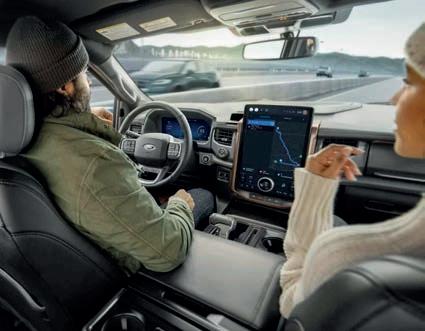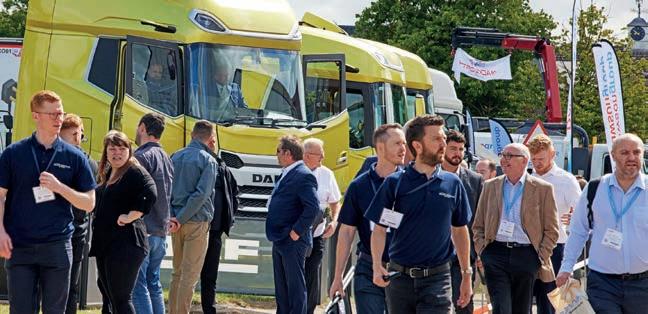
4 minute read
Stanton Logistics
16 rigid trucks that mainly serve the two pallet networks Stanton runs in, Fortec and UPN.
“The networks are just a small part of what we do,” says McGinley. “Our main core business really is temperature controlled but we also do the car parts and new motorbike deliveries. Around 10,000 motorbikes a year come through our warehouse in stillages that we deliver to dealers in the north of England.”
Advertisement
Having been through a recession as the business got going, McGinley knows the importance of being able to quickly shrink the fleet as well as grow it.
“Having agility gives you so much more room to expand and contract quickly,” he reflects. “If you don’t contract quickly, you’re dead in the water. These things are too expensive to sit around. You've got to shed your costs quickly.”
One way Stanton achieves that agility is to have a very good relationship with its finance house.
“We have what we call pay-as-you-go arrangements,” explains McGinley. “That is something we put in place where I’ve given them a guarantee on usage and they have a pay-as-you-go arrangement. We will only pay for it when we use it. On a Monday, if we don’t need that truck, we don’t pay for it.
“It sits in my yard with my colours on. I’ve guaranteed that I will use it over a period of time, and we will get a percentage of usage out of that truck, which they’re happy with. They tend to be older trucks – currently they’re 66 plates – ready for disposal.
“They’re quite happy to still get some revenue from them because trucks are difficult to come by.”
Switching to gas
The latest new venture is moving into compressed natural gas (CNG) trucks, and Stanton has 18 4x2s on order from Iveco. The first batch will be based at Lidl’s new Luton site.
“There’ll be eight going into Luton, which is going to be a full CNG site with no diesel at all,” says McGinley. “We’re buying the gas from CNG Fuels, which produces it from waste products. Some of that will be food waste from Lidl, so there’s a full cycle there.”
The rest of the CNG trucks will be split across Stanton’s Newton Aycliffe and Doncaster sites.
“What they have to do with the 6x2 is put a small pusher on it,” says McGinley. “The truck comes from the factory as a 4x2 and they have to take the gas tanks off and have carbon fibre gas tanks made for them.”
The cost?
“£180,000 I’ve been told for a 6x2 tractor, whereas the 4x2 is £100,000,” says McGinley. “It’s not worth doing for the amount of times you run at 44 tonnes.
“Supermarket work tends to be alright because you get that mix of products across the trailer. We don’t run
Succession Planning
Like many business owners of his age, McGinley is starting to think about the future of the company. “The business has some good people,” he reflects. “I’d like the business to continue with those good people. My retirement might mean me just stepping down and allowing someone to come through as managing director.
“Not necessarily walking away and I would be available when they need me. If you want me to buy your trucks, I’ll buy your trucks for you because nobody buys trucks like I do.”
It is too soon to know if there will be a second generation of McGinleys coming into the business.
“I’ve got three kids,” he says. “My oldest is 18, he’s just going to university. My middle one is a 12-year-old girl and I’ve got a nine-year-old boy. They’re all very different but none of them have really shown any interest in the business. My 18-year-old works here one day a week but all he does is a bit of social media and flyers for us. He’s going on to do some media stuff at university.
“I would never discount it if he wanted to come into the business, but he’s decided to cut his own path and I like that. Go and do your own thing and make your life what you want it to be. Give yourself options.”
Another option, of course, is to sell up to one of the many firms on the acquisition trail or even to the staff.
“Does someone else want to come in and buy us? Great, come and talk to me,” says McGinley. “Would I sell my staff down the river? No, never in a million years. I would turn a deal down that was wrong for my staff.
“Then there’s an option to do a management buyout. I’d help them raise the funds and take over the business. I’d love that.
“There’s also the employee trust option, where you sell the business to a trust and it’s owned essentially by the trust and pays dividends to all the employees. Nothing’s off the table.” at 44 tonnes a lot if I’m honest, but we do have a requirement for some 44-tonners. You need a bit of flexibility in your fleet. We have got some jobs that are lightweight – car parts, things like that – so we’ll put gas trucks on that. That’s an option for us.”
After a period of such rapid growth it is not surprising that piling on more turnover is not McGinley’s top priority.
“We are selective about how we go after new business,” he says. “We tend to hunt with a rifle, not a shotgun. I have a commercial team that dovetails into planning and into accounts.
“We did £23m last year as a group. We’re looking at £27m this year. It’s not all about turnover – we’ll still make a 6% margin.
STORAGE SOLUTIONS:
Stanton’s
“We don’t chase turnover. What I do is have an infrastructure in place that is capable of taking on more at any one time. We’re never bursting at the seams and that means our overheads run high. But it means that people don’t have to work quite as hard and then when we get a pinch point where we need to increase in size, like we’re doing with Lidl, we’ll slot somebody in down at Luton.”

























